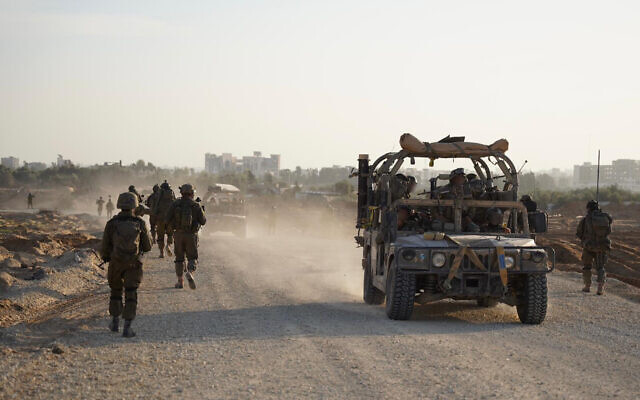The hostilities were resumed last Friday after a week-long humanitarian pause which allowed for the entry of more humanitarian aid into the Gaza Strip and the release of some of the Israeli hostages taken by Hamas at its surprise terrorist attack against south Israel on 7 October.
Hamas has released 86 Israeli children and women, and 24 foreign nationals, in return for Palestinian convicted inmates in Israeli prisons. There are still 137 hostages left in Gaza, among them 13 children and their mothers. Some hostages have been killed by Hamas and there is a risk that the remaining hostages will not survive the conditions and violence in Hamas captivity much longer.
“The children we have treated were shadows of people and completely turned off,” said Dr Efrat Harlev, chief executive of Schneider Children’s Medical Centre, which first received the children and their mothers after their release. “They were under-weight and very pale and weak after having been held most of the time underground. Some of them were whispering and asked for permission for everything.”
“We start seeing them getting back to life,” she added. “It’s a slow process where we watch them, examine them, and listen to them when they start to ask simple questions. Some of them have seen their parents killed or didn’t know if their relatives were alive.”
Haim Regev, The Israeli Ambassador to the EU and NATO in Brussels, told journalists at a press conference last week that he wanted to remind the world that the war started with Hamas massacres in Israeli villages. The Embassy continues to show the horrific footages taken by Hamas terrorists and Israeli soldiers when they arrived to the places where the atrocities took place.
The footages contain material that is strongly disturbing. Israel believes that it is important for European policy makers to be aware of the atrocities, including sexual violence, that were perpetrated by Hamas. What struck him most were the demonstrations in some EU member states, where pro-Hamas demonstrators celebrated the attack and called for the destruction of Israel.
The Ambassador admitted that there is a growing erosion in the support for Israel as the war continues with no end in sight and the humanitarian situation in the Gaza Strip deteriorates. Israel says that Hamas exploits an asymmetric urban war, which is fought close to, under and from civilian buildings and facilities, where it uses civilians as human shields.
“Hamas has a track record of misusing civilian infrastructure as a cover for its military operations,” Peter Stano, EU’s lead spokesperson for foreign affairs, said at the European Commission’s press conference on Monday.
According to Israeli estimates, the number of killed Hamas fighters are about 6,000. The Hamas-run health ministry says that 15,000 people have been killed in the Israeli air strikes and bombardments and doesn't disclose how many of them are fighters. The figures might indicate that up two thirds of the Palestinian casualties are civilians, the majority of them women and children.
Responsibility for civilian losses
The Ambassador said that the best way to avoid civilian losses is to ask the civilian population to move from the battle zones to the south. He declined to elaborate on military planning and explain how safe it would be if the Israeli ground offensive would continue to the south, which it did a few days later.
Both the EU and US have called on Israel to do more to avoid civilian casualties. EU has stated that it is Hamas which brought the war to Gaza after its unprovoked terrorist attack on Israel. Its leadership must have understood that it would lead to a massive Israeli response. That was perhaps also Hamas’ intention as it thought that its attack would trigger a multifront war on a weakened Israel.
According to the Israeli diplomat, Hamas thought that a Western pro-life and affluent society like Israel would not have the stomach for fighting it. They were wrong. But the defense establishment had warned that Israel’s deterrence was damaged by the government’s push for a controversial judicial overhaul which sparked mass demonstrations and a polarised society.
The Israeli Prime Minister did not listen to the warnings. Contrary to senior defense officials, including the Chief of Staff, he has not admitted his responsibility. He keeps saying that the failure to foresee Hamas's attack and defend the border towns will be investigated after the war. In the meantime, he refuses to resign and plans to stay in power once “victory” is won and Hamas has been defeated.
The humanitarian situation risks becoming worse since Israel launched the next phase in its war against Hamas with a ground offensive in the southern part of the Gaza Strip to where the majority of the population in the north had fled for their safety. Israel has announced safe zones for the civilian population but the area is very crowded and there is no escape from it as Egypt has closed its border.
Surrender by Hamas?
The ground offensive was preceded by massive air strikes against Khan Younis where the Hamas leadership is believed to hide, together with tens of thousands of its remaining fighters. A regular army would in this situation surrender to save itself and the civilian population it is supposed to defend. It seems unlikely that Hamas, which is motivated by a jihadist ideology, will do it.
“We don’t see that Hamas is waking up, saying ‘see what happened in Gaza’, we’ll surrender,” said Ambassador Regev. “It won’t happen.”
Hamas might think that it can survive by using the hostages in a bargain with Israel and that the international opinion will pressure Israel to a permanent ceasefire as in previous round of hostilities. They will hardly listen to Mansur Abbas, the leader of an Islamist political party in Israel which supported the previous government.
In a recent interview to CNN, he called on Hamas to be disarmed. “Looking at the past, the decision by terrorist organisations to use violence to achieve their aims have always failed. The victim was always the Palestinian people which pays the price.”
Hamas might be forced to give up if its economic support and funding from abroad would be stopped. Its main funder is Iran but also Qatar - which facilitated the hostage release - has been transferring cash payment to Hamas with Israel’s consent to calm down the situation in Gaza. Funding to Hamas has also been channelled via Turkey.
“There are more countries in the world with ties to Hamas,” Peter Stano commented. “The EU is determined to fight the illegal financing of terrorist organisations and Hamas is on EU’s terrorist list. We are active with our international partners to go after their financing and will intensify our follow-up after what happened on 7 October.”
The Day After
A crucial question is what will happen the day after the war. EU’s common position is still that Hamas has no place in Gaza and must be defeated and replaced by the Palestinian Authority. The Prime Ministers of Belgium and Spain are calling for a permanent ceasefire to save civilian lives but have not explained how there can be peace if Hamas is left in Gaza with its remaining military capability.
Prime Minister Netanyahu is determined that the Palestinian Authority will not take over, even if it would be reformed. He has claimed that it was a mistake to establish the Palestinian Authority in the framework of the Oslo Peace Accords in the 90-ies. “I’m against repeating the same mistake in Gaza,” he said. Only Israel can guarantee that Gaza will be demilitarized, he added at press conference on Tuesday evening.
Asked about the “day after”, Regev, the Israeli Ambassador in Brussels, replied that, “A cease fire would be a win for Hamas. As long as they stay in power, Israel won’t allow any reconstruction of Gaza.” He did not elaborate on what will happen if and when Hamas is dismantled. He added that Israel has no territorial dispute about Gaza, hinting that Israel does not plan to re-occupy the area.
The territorial dispute is about the West Bank where the situation can spiral out of control. The extremist parties are threatening to break up the Israeli government if Netanyahu would recognize the Palestinian Authority as a peace partner. The EU sees the Authority’s role as taking over both Gaza and the West Bank towards a sustainable political solution of the conflict based on the two-state solution.


